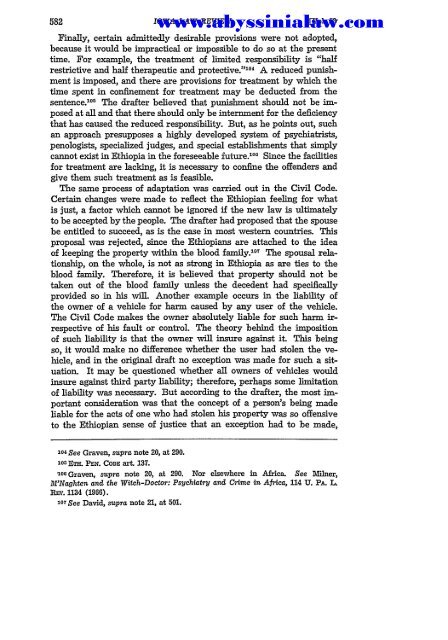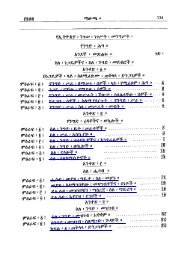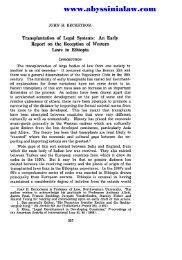Create successful ePaper yourself
Turn your PDF publications into a flip-book with our unique Google optimized e-Paper software.
IOWA LAW REVIEW<br />
Finally, certain admittedly desirable provisions were not adopted,<br />
because it would be impractical or impossible to do so at the present<br />
time. For example, the treatment of limited responsibility is "half<br />
restrictive and half therapeutic and protective1 ° 4 A reduced punishment<br />
is imposed, and there are provisions for treatment by which the<br />
time spent in confinement for treatment may be deducted from the<br />
sentence. 0 5 The drafter believed that punishment should not be imposed<br />
at all and that there should only be internment for the deficiency<br />
that has caused the reduced responsibility. But, as he points out, such<br />
an approach presupposes a highly developed system of psychiatrists,<br />
penologists, specialized judges, and special establishments that simply<br />
cannot exist in Ethiopia in the foreseeable future.' 0 Since the facilities<br />
for treatment are lacking, it is necessary to confine the offenders and<br />
give them such treatment as is feasible.<br />
The same process of adaptation was carried out in the Civil Code.<br />
Certain changes were made to reflect the Ethiopian feeling for what<br />
is just, a factor which cannot be ignored if the new law is ultimately<br />
to be accepted by the people. The drafter had proposed that the spouse<br />
be entitled to succeed, as is the case in most western countries. This<br />
proposal was rejected, since the Ethiopians are attached to the idea<br />
of keeping the property within the blood family. 10 7 [Vol. 53<br />
www.abyssinialaw.com<br />
The spousal relationship,<br />
on the whole, is not as strong in Ethiopia as are ties to the<br />
blood family. Therefore, it is believed that property should not be<br />
taken out of the blood family unless the decedent had specifically<br />
provided so in his will. Another example occurs in the liability of<br />
the owner of a vehicle for harm caused by any user of the vehicle.<br />
The Civil Code makes the owner absolutely liable for such harm irrespective<br />
of his fault or control. The theory behind the imposition<br />
of such liability is that the owner will insure against it. This being<br />
so, it would make no difference whether the user had stolen the vehicle,<br />
and in the original draft no exception was made for such a situation.<br />
It may be questioned whether all owners of vehicles would<br />
insure against third party liability; therefore, perhaps some limitation<br />
of liability was necessary. But according to the drafter, the most important<br />
consideration was that the concept of a person's being made<br />
liable for the acts of one who had stolen his property was so offensive<br />
to the Ethiopian sense of justice that an exception had to be made,<br />
' 0 4 See Graven, supra note 20, at 290.<br />
105 ETIL PEN. CODE art. 137.<br />
100Graven, supra note 20, at 290. Nor elsewhere in Africa. See Milner,<br />
MI'Naghten and the Witch-Doctor: Psychiatry and Crime in Africa, 114 U. PA. L.<br />
Rsv. 1134 (1966).<br />
'107 See David, supra note 21, at 501.





